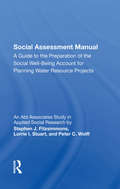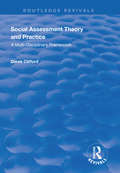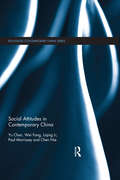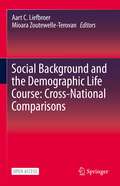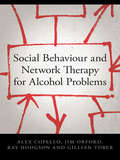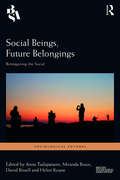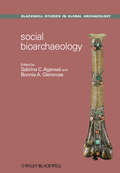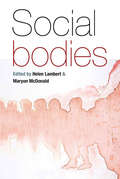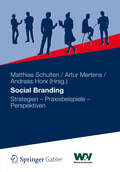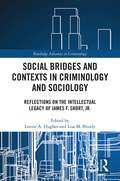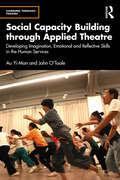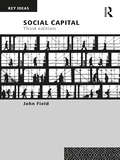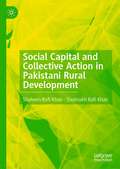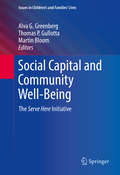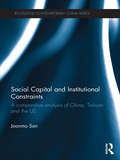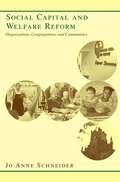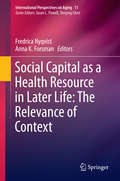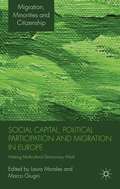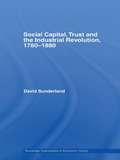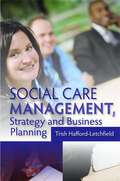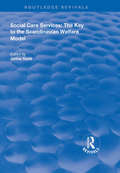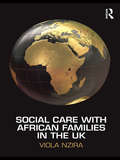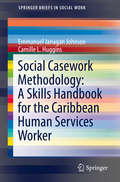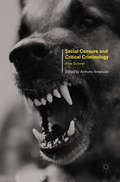- Table View
- List View
Social Assessment Manual
by Judith Fitzsimmons Edward SampsonA Social Well-Being Account is the product of an assessment of the comparative beneficial and adverse social effects likely to occur as a result of implementing—or not implementing—a particular development plan. This volume establishes procedures for conducting research and analyzing data in order to make this assessment for water development plans
Social Assessment Theory and Practice: A Multi-Disciplinary Framework (Routledge Revivals)
by Derek CliffordFirst published in 1998, Social Assessment Theory and Practice provides an innovative and comprehensive theoretical and practical basis for social assessment. It examines both multi-disciplinary and multi-professional issues in social assessment and is based on perspectives drawn from all the major service users and oppressed social groups. The book integrates social theory and practice at multiple levels, using summaries, checklists, diagrams and a running case study.
Social Assistance in Developing Countries
by Armando BarrientosThe rapid spread of large-scale and innovative social transfers in the developing world has made a key contribution to the significant reduction in global poverty over the last decade. Explaining how flagship anti-poverty programmes emerged, this book provides the first comprehensive account of the global growth of social assistance transfers in developing countries. Armando Barrientos begins by focusing on the ethical and conceptual foundations of social assistance, and he discusses the justifications for assisting those in poverty. He provides a primer on poverty analysis, and introduces readers to the theory of optimal transfers. He then shifts the focus to practice, and introduces a classification of social assistance programmes to help readers understand the diversity in approaches and design in developing countries. The book concludes with an analysis of the financing and politics of the emerging institutions and of their potential to address global poverty.
Social Attitudes in Contemporary China (Routledge Contemporary China Series)
by Chen Yu Fang Wei Liqing Li Paul Morrissey Nie ChenUnlike many studies of social attitudes, which are based on large scale quantitative surveys, or which focus on the attitude of elites, this book considers the views of ordinary people, and is based on in-depth, qualitative interviews. This approach results in rich, nuanced data, and is especially helpful for highlighting ambivalent attitudes, where respondents may hold positive and negative views on a particular topic, views which are liable to change. The book examines attitudes on a range of subjects of current importance, including views on nationalism and internationalism, housing preferences, and educational ambitions. Throughout, the book explores how far attitudes are influenced by traditional Chinese values or by the neo-liberal outlook fostered by recent reforms, and concludes that materialism and individualism have increased.
Social Background and the Demographic Life Course: Cross-National Comparisons
by Aart C. Liefbroer Mioara Zoutewelle-TerovanThis open access book examines how childhood social disadvantage influences young-adult demographic decision-making and later-life economic and well-being outcomes. This book in particular focuses on testing whether the consequences of childhood social disadvantage for adult outcomes differ across societies, and whether these differences are shaped by the “context of opportunities” that societies offer to diminish the adverse impact of economic and social deprivation. The book integrates a longitudinal approach and provides new insights in how the experience of childhood disadvantage (e.g. low parental socio-economic status, family disruption) influences demographic decisions in adulthood (e.g. the timing of family-events such as cohabitation, marriage or parenthood; the risk of divorce or having a child outside a partner relationship; the exposure to later-life loneliness, poor health, and economic adversity). Moreover, using a cross-national comparative perspective it investigates whether the relationships of interest differ across nations, and tests the “context of opportunities” hypothesis arguing that the links between childhood disadvantage and adult outcomes are weakened in societal contexts offering good opportunities for people to escape situations of deprivation. To do so, the book analyzes national contexts based on economic prosperity, family values and norms, and welfare-state arrangements.
Social Behaviour and Network Therapy for Alcohol Problems
by Jim Orford Alex Copello Ray Hodgson Gillian ToberHighly Commended in the Psychiatry category at the 2010 BMA Medical Books Awards! This book serves as a manual for clinicians working with people with alcohol problems. The manual is based on previous research in addiction treatment, including family and social network interventions, as well the authors' own work developing and evaluating Social Behaviour and Network Therapy (SBNT) for example in the United Kingdom Alcohol Treatment Trial (UKATT). Containing a range of ideas the book is guided by a key principle: the development of social support for a positive change in drinking behaviour. Divided into three sections topics include: an introduction to the evidence base underpinning SBNT core components of the treatment common questions asked about the intervention. Featuring a series of practical handouts, this book will be essential reading for clinicians, counsellors, nurses, psychologists and all those involved in the treatment of alcohol misuse and dependence.
Social Beings, Future Belongings: Reimagining the Social (Sociological Futures)
by Helen Keane Anna Tsalapatanis Miranda Bruce David BissellSocial Beings, Future Belongings is a collection of sociological essays that address an increasingly relevant matter: what does belonging look like in the twenty-first century? The book critically explores the concept of belonging and how it can respond to contemporary problems in not only the traditional domains of citizenship and migration, but also in detention practices, queer and feminist politics, Australian literature and fashion, technology, housing and rituals. Drawing on examples from Australia, Europe, the United Kingdom and the United States, each topic is examined as a different kind of problem for the future – as a toil, an intensity or a promise. Ultimately, the collection argues that creating new ways to belong in contemporary times means reimagining the traditional terms on which belonging can happen, as well as the social itself. Read on their own, each chapter presents a compelling case study and develops a set of critical tools for encountering the empirical, epistemological and ontological challenges we face today. Read together, they present a diverse imagination that is capable of answering the question of belonging in, to and with the future. Social Beings, Future Belongings shows how belonging is not a static and universal state, but a contingent, emergent and ongoing future-oriented set of practices. Balancing empirical and theoretical work, this book will appeal to researchers, students and practitioners alike.
Social Bioarchaeology (Wiley Blackwell Studies In Global Archaeology Ser. #13)
by Bonnie A. Glencross Sabrina C. AgarwalIllustrates new methodological directions in analyzing human social and biological variation Offers a wide array of research on past populations around the globe Explains the central features of bioarchaeological research by key researchers and established experts around the world
Social Bodies
by Maryon Mcdonald Helen LambertA proliferation of press headlines, social science texts and "ethical" concerns about the social implications of recent developments in human genetics and biomedicine have created a sense that, at least in European and American contexts, both the way we treat the human body and our attitudes towards it have changed. This volume asks what really happens to social relations in the face of new types of transaction - such as organ donation, forensic identification and other new medical and reproductive technologies - that involve the use of corporeal material. Drawing on comparative insights into how human biological material is treated, it aims to consider how far human bodies and their components are themselves inherently "social." The case studies - ranging from animal-human transformations in Amazonia to forensic reconstruction in post-conflict Serbia and the treatment of Native American specimens in English museums - all underline that, without social relations, there are no bodies but only "human remains." The volume gives us new and striking ethnographic insights into bodies as sociality, as well as a potentially powerful analytical reconsideration of notions of embodiment. It makes a novel contribution, too, to "science and society" debates.
Social Branding
by Andreas Horx Artur Mertens Matthias SchultenRund 40 Prozent der Unternehmen sind mittlerweile in sozialen Medien aktiv. Die meisten von ihnen, um die eigene Marke zu profilieren und die Markenloyalität ihrer Kunden zu steigern, kurz: um Social Branding zu betreiben. Mit dem Social Branding geht eine Veränderung der Markenkommunikation einher. Waren Unternehmen bislang nur Sender von Markenbotschaften, so empfangen sie nun auch Botschaften ihrer Kunden. Diese sind nicht nur für das Unternehmen sichtbar, sondern auch für andere Kunden. Damit nehmen Kunden aktiv Einfluss auf das Markenimage, weshalb sich die Markenführung mit einer Reihe neuer Fragen befassen muss: * Wie kann die Community sinnvoll in die eigene Markenführung eingebunden werden? * Wie können Social-Branding-Kampagnen entwickelt, lanciert und überwacht werden? * Welche Kompetenzen sind für das Social Branding erforderlich? * Welche rechtlichen Rahmenbedingungen sind zu berücksichtigen? * Was sind Erfolgsfaktoren im Social Branding? Das Buch "Social Branding" liefert aktuelle Impulse für die Markenführung in sozialen Medien. Es enthält Beiträge renommierter Hochschulen und bekannter Unternehmen, wie zum Beispiel 1&1, Deloitte, Harley-Davidson, MasterCard, Nestlé, Scout24, Telekom, VZ Netzwerke, Warsteiner und XING sowie ein Interview mit Audi, Dell und Swiss International Air Lines.
Social Bridges and Contexts in Criminology and Sociology: Reflections on the Intellectual Legacy of James F. Short, Jr. (Routledge Advances in Criminology)
by Lorine A. Hughes and Lisa M. BroidySocial Bridges and Contexts in Criminology and Sociology brings together leading scholars to commemorate the illustrious career and enduring contributions of Professor James F. Short, Jr., to the social sciences. Although Professor Short is best known as a gang scholar, he was a bridging figure who advanced the study of human behavior across multiple domains. Individual chapters document Professor Short’s intellectual development and highlight the significance of his theoretical and empirical work in a range of specialty areas, including suicide and homicide, criminological theory, field and self-report survey research methodologies, white-collar crime, hazards and risks, levels of explanation, microsocial group processes, and the etiology of gang violence and delinquency. A special feature of this book is the collection of brief personal reflection essays appearing after the main chapters. Authored by Professor Short’s students, colleagues, collaborators, and friends, these essays provide powerful testimonials of the influence of his intellectual legacy as well as his generous spirit and commitment to mentorship. Written in a clear and direct style, this book will appeal to students and scholars of criminology and sociology, and all those interested in the important contributions of Professor James F. Short, Jr., to these subject areas.
Social Capacity Building through Applied Theatre: Developing Imagination, Emotional and Reflective Skills in the Human Services (Learning Through Theatre)
by John O'Toole Au Yi-ManAs experts in both applied theatre and education, Au Yi-Man and John O’Toole outline how applied theatre techniques can be used to support workers in the human services to develop crucial skills such as resilience, imagination, critical thinking, and reflection.Highlighting under-emphasised skills and qualities in the human services professions, this book combines theory with context-specific practice to support capacity building across sectors. Drawing on a detailed study of NGO workers learning to use applied theatre techniques in professional development, the book offers insight into the learning and experiences of the participants and how these can be applied to future training programs. The book also provides a deeper understanding of how adult learners, from different backgrounds and levels of experience, approach their professional training. Rich with resources, the book features complete course examples, including theatre of the oppressed, process drama, and educational theatre, as core drama techniques.Opening up new opportunities for applied theatre practitioners and educators, this book is a must-read for teachers in any human services field intending to use drama or applied theatre in their training.
Social Capital (Key Ideas)
by John FieldThe term ‘social capital’ is a way of defining the intangible resources of community, shared values and trust upon which we draw in daily life. It has achieved considerable international currency across the social sciences through the very different work of Pierre Bourdieu in France and James Coleman and Robert Putnam in the United States, and has been widely taken up within politics and sociology as an explanation for the decline in social cohesion and community values in western societies. It has also been adopted by policy makers, particularly in international governmental bodies such as the World Bank. This fully revised third edition of Social Capital provides a thorough overview of the intense and fast-moving debate surrounding this subject. New material encompasses: Social capital and the internet Social capital and the economists Changing policy understandings of social capital Social capital and resilience in tough times This clear and comprehensive introduction explains the theoretical underpinning of the subject, the empirical work that has been done to explore its operation, and the influence that it has had on public policy and practice. It includes guides to further reading and a list of the most important websites.
Social Capital and Collective Action in Pakistani Rural Development
by Shahrukh Rafi Khan Shaheen Rafi KhanThis book distinguishes conceptually between indigenous and constructed social capital and the associated spontaneous and induced collective action for rural development and natural resource preservation. While some of the case studies in this book show that induced collective action can lead to cost-effective, community-centric and empirically grounded rural development initiatives, other case studies show that spontaneous collective action, based on indigenous social capital, can result in resource preservation, positive development outcomes, and resistance to the excesses engendered by conventional development. The authors also explore a hybrid form whereby spontaneous collective action is given a more effective and sustainable shape by an outside organization with experience of induced collective action. Exploring alternative community-centric paths to development, especially those attuned with sustainability imperatives, is part of a global search for solutions. While the volume draws on the Pakistani case, the problem with conventional development approaches and the need for complementary alternatives is not unique to only this country; and the volume has broader relevance to students and researchers across the fields of social policy and development.
Social Capital and Community Well-Being
by Thomas P. Gullotta Martin Bloom Alva G. GreenbergThis book provides a comprehensive overview of how communities can leverage their social capital to improve overall quality of life for citizens. In addition, it offers detailed guidance on the design, implementation, and evaluation of social capital initiatives. It defines critical concepts of social capital, its decline in recent years, and the potential for rebuilding it through progressive social policy initiatives. Chapters present an innovative social policy template, Serve Here, for improving Americans' collective quality of life, starting with young adults. Serve Here sets out a comprehensive, sustainable service learning plan aimed at increasing quality higher education for young adults, reducing college debt, and enhancing long-term civic participation and community building. The book offer guidelines for developing tailored solutions to ensure greater parity of social capital to regional, demographic, and other marginalized populations. Featured topics include: The civic value of social capital. The economics of social capital in communities. Building social capital across communities by leveraging personal relationships. Social capital and returning military veterans. Millennials and social capital. Teaching the social entrepreneurs of tomorrow. Social Capital and Community Well-Being: The Serve Here Initiative is a valuable resource for clinicians and practitioners as well as researchers and graduate students in community psychology, social work, education, and healthcare policy.
Social Capital and Institutional Constraints: A Comparative Analysis of China, Taiwan and the US (Routledge Contemporary China Series)
by Joonmo SonThe sociological concept of social capital has grown in popularity in recent years and research programs in North America, Europe, and East Asia have demonstrated how social capital has a significant impact on occupational mobility, community building, social movement, and economic development. This book uses new empirical data to test how social capital works in different societies with diverse political-economic and cultural institutions. Taking a comparative approach, this study focuses on data from three different societies, China, Taiwan, and the United States, in order to reveal the international commonalities and disparities in access to, and activation of, social capital in labor markets. In particular, this book tests whether political economic and cultural differences between capitalist and socialist economic systems and between Western and Confucian cultures create different types of individual social networks and usages. This comparison leads to Joonmo Son’s fundamental argument that the institutional constraints of a society’s political economy on the one hand, and culture on the other, profoundly impact on both the composition and utilization of social capital. Based on rigorous statistical analysis, this book will be essential reading for students and scholars of social capital, economic sociology, and comparative politics.
Social Capital and Welfare Reform: Organizations, Congregations, and Communities
by Jo Anne SchneiderIn this groundbreaking study, Jo Anne Schneider considers the reasons behind the limited success of most welfare reform initiatives and offers evidence-based recommendations for enhancing the effectiveness of welfare policy.Schneider draws on her rich and nuanced ethnographic studies of Philadelphia, Milwaukee, and Kenosha, Wisconsin to clarify the role of social capital for both individuals and institutions. She shows that the social relationships and patterns of trust that enable people to gain access to resources like government services, organization funding, and jobs are crucial in helping families achieve their goals. Schneider examines the complex ways in which social capital functions in conjunction with economic, human, and cultural capital, and explores social capital dynamics among government, nonprofits, and congregations that together provide the welfare support system.Social Capital and Welfare Reform is compulsory reading for researchers and students in social work, sociology, anthropology, public policy, education, community psychology, social psychiatry, and non-profit and public administration as well as policy makers interested in welfare reform, poverty, and nonprofits.
Social Capital as a Health Resource in Later Life: The Relevance of Context
by Fredrica Nyqvist Anna K. ForsmanThis book examines the social aspects of healthy ageing for older individuals. It features more than 15 papers that explore the relevance of the social environment for health on the micro, meso, and macro level. Overall, the book applies a comprehensive contextual approach that includes discussion of how family and friends, neighborhoods, nations, and welfare regimes influence health. The book first explores the issue on the individual level. It looks at the importance of social capital for health among older people, examines types of social networks and health among older Americans, as well as discusses dynamic social capital and mental health in late life. Next, the book looks at the issue through a neighborhood and societal context, which takes into account day-to-day interaction in the immediate environment as well as the social, health, and economic policies in place in different regions in the world, including America, Europe, Asia, and Africa. From there, the book goes on to offer implications and recommendations for research and practice, including the management of related concepts of research on well-being and health. It also offers a psychosocial approach to promoting social capital and mental health among older adults. This book provides health professionals as well as researchers and students in gerontology, sociology, social policy, psychology, and social work with vital insights into the social factors that increase healthy life years and promote well-being.
Social Capital, Political Participation and Migration in Europe
by Marco Giugni Laura MoralesHow can European societies more effectively promote the active engagement of immigrants and their children in the political and civic life of the countries where they live? This book examines the effect of migrants' individual attributes and resources, their social capital and the political opportunities on their political integration.
Social Capital, Trust and the Industrial Revolution: 1780-1880 (Routledge Explorations In Economic History Ser.)
by David SunderlandThe first text to examine the concept of trust and the role that it played on the Industrial Revolution, this book is a key resource for students studying nineteenth century British history as well as historically minded sociologists.Analytical in style and comprehensive in approach, Social Capital, Trust and the Industrial Revolution covers a ran
Social Care Management, Strategy and Business Planning
by Trish Hafford-LetchfieldSocial Care Management, Strategy and Business Planning is a comprehensive guide to strategic social care management, covering all the knowledge and skills that managers in the 21st century must have, and showing how to make theory a practical reality. The book aims to make business planning a more accessible and user-friendly process, offering practical advice on how to tackle the everyday tasks which good social care management should involve. Topics covered include strategic planning, business development, commissioning and contracting, project management, decision-making, risk, and evaluation techniques. The book also acknowledges the challenges of working collaboratively within a complex legislative and policy framework and juggling different aspects of the management tasks whilst retaining professional identities and ethics. Also included are practical examples and lively tips and comments from practising managers on their experiences in different areas of business planning. This book will be essential reading for anyone involved in managing or leading practice either in the front line or at a more strategic level. It will be useful to post-qualifying social work students and is particularly valuable to anyone following a management training programme.
Social Care Services: The Key to the Scandinavian Welfare Model (Routledge Revivals)
by Jorma SipiläFirst published in 1997, this volume aimed to study social care services as a specific type of social policy that operates on a different set of principles as supportive services rather than as poor relief or social security work. The focus is on determining what is specifically Scandinavian about the world-famous Scandinavian welfare state, with studies on issues including the origins of four social care service models, the development of local authority social services in Iceland and social services as a gender issue.
Social Care with African Families in the UK
by Viola NziraThis important text promotes understanding of the complexities and diversities of African family life. It stimulates creative thinking about how social care professionals can develop meaningful relationships and engage confidently and effectively with African families they encounter within work contexts. The book will help students and professionals to develop specific knowledge and skills for working with African families, including refugees, asylum seekers, new and settled immigrants and people of dual heritage. Whilst highlighting differences in terms of practices across the continent, the common threads and shared identities of these families can provide the building blocks for new and relevant knowledge which then inform anti-oppressive practice. Issues such as child discipline, officialdom, roles and responsibilities within the family, image and identity and the perception of others are discussed in chapters covering: • economic and social pressures • family structures • marriage patterns/partnerships • mortality and death • faith and spirituality Containing numerous illustrative examples, this accessible text will be useful to all social work and social care students.
Social Casework Methodology: A Skills Handbook for the Caribbean Human Services Worker (SpringerBriefs in Social Work)
by Emmanuel Janagan Johnson Camille L. HugginsThis brief is a practical reference contextualizing social casework methodology in a specifically Caribbean cultural and historical context. It emerged from the experiences of human services workers and educators working in the Caribbean. The concepts of social welfare policy and programs are relatively new to the Caribbean as historically Christian-based organizations and local communities took the responsibility of caring for those in need. As social problems grew more complicated and threatened the security of the nation (e.g., gang violence), it became clear that governments of these small island states needed to provide a systematic approach in dealing with these social problems to help their citizens have a better quality of life. Social Casework Methodology: A Skills Handbook for the Caribbean Human Services Worker outlines a systematic approach that human services workers will find useful while working with clients in the Caribbean. It also is an easy-to-use text that defines social casework methodology, components of the methods, case histories, and exercises for social work students interested in working in the human services sector in the Caribbean.
Social Censure and Critical Criminology: After Sumner
by Anthony AmatrudoThis edited collection focuses on the sociology of 'social censure' – the sociological term advocated by Colin Sumner in his seminal writing of the 1980s and 1990s. Social censure has become increasingly important in contemporary criminological writing. This can especially be seen in recent writing on gender and race and also in terms of the way that the state's relationship to crime is now understood. This collection addresses a deficit in the published literature and both revisits themes from an earlier era and looks forward to the development of new writing that develops Sumner’s seminal work on social censure. The contributors are drawn from leading scholars from across the Social Sciences and Law and they address a wide range of issues such as: race, youth justice, policing, welfare, and violence. The resulting volume is an interdisciplinary text which will be of special interest to scholars and students of Critical Criminology and Socio-Legal Studies, as well as those interested in the operation of the criminal justice system and criminological theory.
